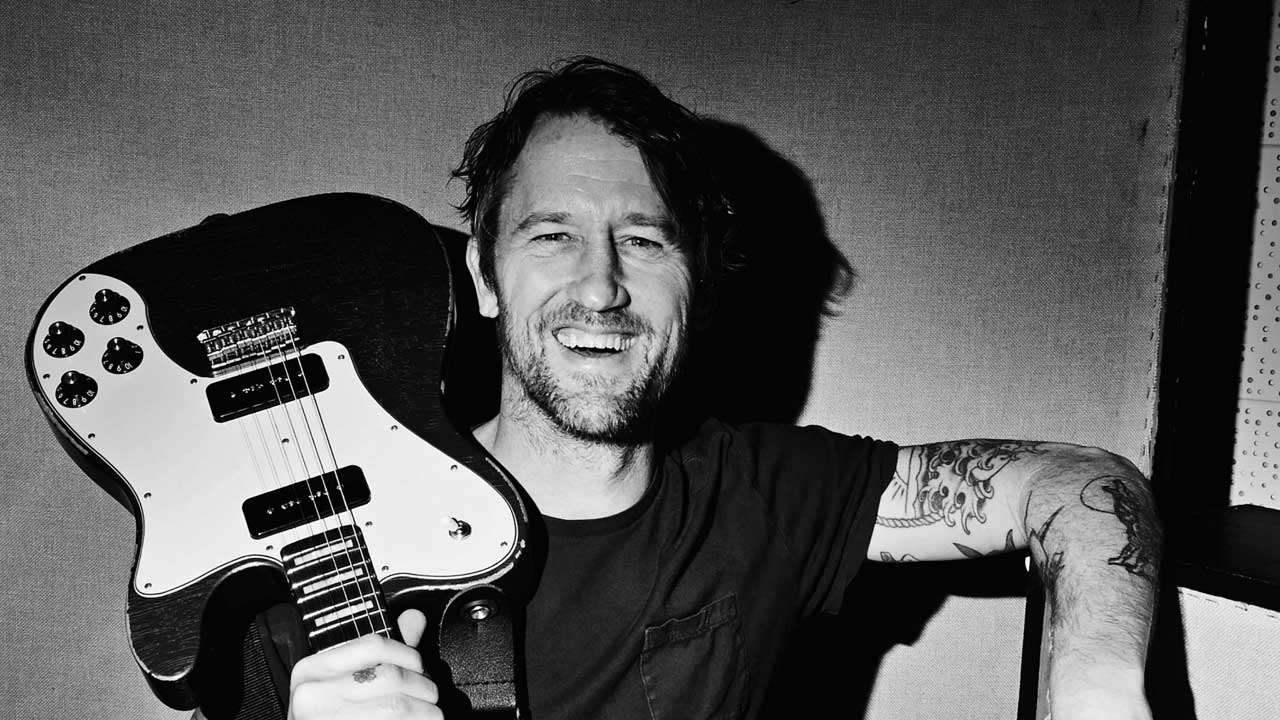
"To be honest, I’m not good at downtime,” says Chris Shiflett. “I have to be playing, learning something new all the time.”
That explains why the long-time Foo Fighters guitarist wears so many professional hats, hosting a musicians’ interview podcast (Walking The Floor) and a guitar-centric vodcast (Shred With Shifty), while pushing further into a burgeoning solo career with the release of his third album, Lost At Sea.
Shiflett’s easy-going demeanour and enthusiasm make him an engaging companion, whether he’s singing about seizing the moment, or breaking down a Rush guitar solo with Alex Lifeson.

Which posters did you have on your wall as a kid?
When I was in elementary school I had pictures of Kiss all over my walls. Later a Randy Rhodes poster, a Sex Pistols poster. A lot of the time you were limited to what your local record store had [laughs]. As I got older I started collecting flyers; Armored Saint, L.A. Guns, Poison. It’s funny, my wife used to be a stylist, and she would always put together inspiration boards, where she’d cover the walls with photos. It’s kind of like that for teenage rock’n’rollers and posters. It’s your inspiration board.
You got to perform with Kiss, right?
Yes, with Paul Stanley a few times. And I did this all-star school fundraiser where Gene Simmons was a guest. On one hand, they’re just nice guys and great players. But they were the ones on the posters in my room when I was young, and their records are the reason I started playing guitar.
Not dwelling on the past is a recurring theme on your new record. Isn’t that a challenge as a songwriter?
Yeah, I think we’re all nostalgic, and kind of overly sentimental. With songwriting, I’m constantly digging into earlier periods in my life. And I find myself pushing back against that because too much nostalgia is a dangerous thing. I try to write in the present. I have a pretty happy life, but I’m not comfortable with happy-go-lucky, zip-a-dee-doo-dah songs. There’s real-life stuff that happens over time – friends dying, thoughts of mortality – and some of these songs really sort of speak to that.
Most of the album was recorded in Nashville. What’s your impression of the city?
I’m a huge fan of country music and all its tentacles. If you’re gonna make records that are steeped in that influence, there’s no better place to work. The Foo Fighters spent about a week there recording a song for the Sonic Highways album, and I was intrigued. It’s so humbling to be in the studio with all those top-notch players who bring so much to your songs. I never experienced that anywhere else.
What has it meant to you to play on the Grand Ole Opry?
It’s been incredible. You don’t go into that building without knowing the history of it. The stage, you’re standing on the same piece of wood where Bill Monroe and Hank Williams stood.
How was it making the transition from your gig as an established sideman to frontman on your solo stuff?
Challenging [laughs]. Guitar playing is my comfort zone. But to be the singer and then also have to talk to the crowd, I had to work at that. What you realise is that people want to have a good time. They’ve hired a sitter, bought tickets, bought a few drinks, maybe bought a T-shirt, they’ve invested in the evening. So that’s my job up on stage, to provide them with a good time. Once I figured that out, things got a lot better.
On your Instagram there’s a promo pic of your early group Lost Kittens.
That was my band from ninth grade until 1998. We were trying to be like Hanoi Rocks or Faster Pussycat, but our songs were kind of all over the place, with three separate intros and five-minute guitar solos [laughs]. We moved to LA after high school and tried to get a record deal. It was the time of grunge; we saw the writing on the wall and broke up. But all of us went on to have music careers. And my buddy Robert, who was our drummer, is playing with me on the road now.
You’re an avid surfer. Is there any overlap with your music?
We just did two weekend runs with my solo band in California, and all afternoon, before the shows, we surfed. Then we loaded in, did soundcheck and played the gig. You can’t do that everywhere. But goddamn, when you have those kinds of days on tour, it puts everybody right! There’s something about the ocean. It does something magic to you.
What do you like most about doing your podcasts?
Both shows were born out of my own curiosity. I found with Walking The Floor, it was a really good excuse to sit and talk to my heroes. And also to be constantly learning about new music. And on Shred With Shifty, I hope it’ll be a tool for people to learn about guitar playing, amps and gear.
The Alex Lifeson episode was amazing.
He was so thoughtful, digging into why he played the Limelight guitar solo the way he did. I’ve never heard somebody express an approach like that. And it changed the way I think about my own solos.
What are you reading?
I just finished Peter Guralnick’s Last Train To Memphis, the first volume of his Elvis biography. It gets deep into his origins. It’s amazing.
Foo Fighter, solo artist, host of two podcasts. Is it challenging to wear so many hats?
The older I’ve gotten, I’ve been sort of gripped by this feeling of: “Damn, I wasted so much time when I was younger!” And you never get that back. I’m lucky that I have been able to do music full-time. And I want to keep doing it.
Lost At Sea is out now via Snakefarm.







